- Home
- Rachel Caine
Killman Creek (Stillhouse Lake Series Book 2) Page 12
Killman Creek (Stillhouse Lake Series Book 2) Read online
Page 12
He opens the door and steps quickly back, and I see our nice hostess standing there in her blue sari, smiling. There’s another advantage of having the gun down; I can quickly slip it into a pocket of the robe before she turns her gaze toward me. “Please excuse me, I came for your clothes . . . ?”
I’d forgotten all about the laundry, and I feel incredibly stupid. Hot and cold at once. I go and grab mine. Sam stuffs them in with his and hands her the crinkling plastic bag, and she gives us a nod and a smile and moves away. She turns back as he begins to close it. “Oh, wait, sir,” she says, stepping back. Behind her is her daughter, with a silver tray. “Your scones.”
“Sorry it took so long,” the daughter says. “I hope you like them.”
They look delicious, and I say so and thank her. I wince as Sam closes and locks the door again. “Sorry,” I say. “I’m jumpy.” My heart’s racing. My hands are shaking. Melvin has put poison in my veins, like the call was a snakebite.
“Yeah, got that,” he says as he grabs a treat from the tray I’m holding in both hands. He doesn’t miss the tremors. “What is it?”
I don’t want to tell him, not yet, so I slide the tray onto the other, empty table, shake my head, and go back to the bedroom. I put my gun back in its holster. I turn the light off in the bedroom, and after a second of hesitation, I walk to the window and slide the closed curtain aside, just enough to look.
There’s a deck down on the first floor, with round wooden tables and chairs arranged in precise formation around them. The shade umbrellas are tightly folded. Beyond the deck, the lawn rolls down a hill and into underbrush, and beyond that, a forest and climbing hills. It’s a pretty place.
There’s no one down there. Not a soul stirring.
I turn back to the bed as the phone buzzes for attention. This time, I accept the call and say nothing. Just wait. The silence stretches, and finally, Melvin says, “Made you look.” I can hear the smile in his voice. Smug. Relentless.
“I’m not afraid of you, you murderous shit,” I tell him. “Fuck off.”
He hangs up. I sense that Sam’s hovering near my doorway, not quite asking, and without raising my head I say, “That was him. I’m sorry. I let him gaslight me. Won’t happen again.”
“Hey.” I do look up, finally, and his face is tense, but there’s compassion there, too. Concern. “None of this is your fault, Gwen. It never was. Remember that.”
I nod, but my heart isn’t in it. I was uniquely situated to stop a monster, for years. It’s impossible not to feel that. To know in my bones that I bear part of that blame, if only in my own mind. “He said he was here,” I say. “Outside. And then I heard the knock—”
“Bad timing,” Sam says. “Story of our lives. How the hell did he get your number?”
I take a deep breath and shake my head. I don’t know, but I can guess. Absalom. The Georgia cops demanded our cell numbers. That info got entered somewhere in a system, and Absalom would have been looking for those reports. He knows we’re in Georgia, I think, and my pulse jumps again. We shouldn’t stay here. We should run.
But that’s the old Gina, whispering to me. I’m done running. I’m hunting.
I tell Sam that Melvin knows we’re in the state, because I can’t not tell him that, and I feel a little weight come off me when he shrugs. “Have to expect that. We did send up a nice big flare at that cabin. He doesn’t know we’re here. You’re right. He was gaslighting you.”
“So should we go?”
“Do you want to go?” I silently shake my head. “Then we should get a decent night’s rest.”
Sam comes into the room, but not far. Leans against the doorpost. We’re so careful with distance, the two of us; we understand the minefield of memory and deceit and a bloody, sorrowful past.
And it doesn’t mean that the desire to step into that minefield isn’t real, too. I can feel the pull between us, slow and steady, a constant tension that we keep dialed down to a low hum, for the sake of safety. We might sleep in the same space, but we don’t sleep together. I know we’re both thinking about it on some level, especially in this calm, lovely place, stripped down to robes that untie so easily.
What dries my mouth and shakes my confidence is that I wonder if this powerful attraction I feel toward him right now is the rebound reaction of having heard Melvin’s voice. I want comfort. I crave safety. And I know that seeking that in the arms of another man—even Sam—is dangerous. My safety has to be found within myself.
Sam’s probably not doing as much self-analysis, but then again, he isn’t coming forward, either. He stays safely on his side of the line.
“Could still be something in those receipts,” Sam says, and I think it’s just to say anything to break the silence. “Some of the supplies he bought don’t look right. We didn’t see any heavy chain in the house, did we? Saws?”
Those aren’t unusual purchases for a rural cabin, but still, he’s right. We didn’t, not inside the cabin, anyway. I’d think Mike Lustig would have mentioned if he’d found them down in the wreckage of the basement. “You’re thinking he bought them for someone else . . . ?”
“I’m thinking that this could be the beginning of a long thread we can follow. Don’t you?”
I nod. I suddenly flash on something, and I get up and walk back to the rolltop desk. Sam follows and stands near as I quickly thumb through receipts, looking for the most innocuous thing of all.
Paper towels. Toilet paper. The bulk purchases are on the same online order for other household things, like air freshener and bleach, in quantities normally reserved for large businesses. I don’t even know why it’s attracted my attention.
I stare at it for a second, not quite sure what it is that I’m seeing in it. Probably nothing. People buy things in bulk. Paper towels don’t go bad. So why does it bother me?
“Shit,” I say out loud when I finally see it. I hold the page out to Sam and watch him go through the same exact process. It takes about the same amount of time. We’re well matched, Sam Cade and I.
“The address,” he says. “This didn’t get sent to the cabin.”
“No,” I agree. And even though I’m reluctant, I say, “You’d better call Mike.”
Mike Lustig cheers up considerably when he hears our news. He wants a fax, but we compromise and send the address to him instead. Or rather, I do that. Sam is busy mapping the address from the invoice on the Internet; he’s careful to launder our connections through anonymizers to disguise our IP address, and I don’t even have to remind him to do it. Google Maps shows us the location. It’s a nothing-much sort of industrial address in Atlanta. I’ve been half expecting a remailing place, but this looks like a warehouse, as anonymous as all the other ones squatting near it. No cars visible in the snapshot of time that the map vehicle passed by it. Concrete and metal, rusting and dented. Isolated, too, by tall barriers of weeds that have grown up, in, and through the sagging chain-link fence. NO TRESPASSING signs, buckshot-scarred into near illegibility.
This place doesn’t need volume-store levels of toilet paper.
“Jesus,” I say, staring over his shoulder at the still image. “What the hell is this?” But I’m afraid I already know. My voice goes soft. “Do you think that’s where—”
“Where they filmed? I don’t know,” he says.
Mike calls back in five minutes. He doesn’t sound happy. “I can go with you to check this place out, but there’s not a hope in hell I can get a search warrant based on what you’ve got,” he says. “Seeing as how you appropriated the evidence and any judge who isn’t pass-out drunk can see I don’t have a legal leg to stand on. Tell you what: tomorrow, you bring that goddamn drive and the paperwork, and you give it to me. We’ll take a nice long walk around the perimeter of this place, and I’ll put my people to work digging up ownership. Maybe we can come at this from a different direction that gets us into court.”
He’s frustrated. I don’t blame him. The FBI is overstretched, handling crime and terr
orism at the same time, and he doesn’t need the complication we’ve given him. Then again, he’s probably aware that we’ve given him a tremendous gift, too. At least, I hope so.
“Right,” Sam says. “Where do you want us to meet you?”
Lustig rattles off an address, which happens to be in a suburb of Atlanta. A six-hour drive from where we are tonight. We agree on a 10:00 a.m. rendezvous. That means we need to be up and driving before dawn, but that doesn’t bother either of us much. I feel lighter when Sam closes off the call. I feel dizzy with it. Yes. Finally.
Without thinking, I put my hand on Sam’s shoulder. He reaches up and puts his fingers over mine. His touch feels so unexpected, so warm, that I realize how chilled I am. Why not, I think, and I am almost giddy with it. The kids are safe. We’ve got a short rest in a beautiful, calm, secure place.
He looks up at me, and I see the spark. I feel it.
He smiles a little sadly. “I know,” he says. It’s not exactly a question. Not exactly a statement. But it’s a toe across the line, inviting me to match him.
And I want to, so much. I look at Sam, and I think that in another life I would have met this man, and liked him, and loved him, and we would have been something good. Something lasting.
But this is not that world.
I lean forward and kiss him gently on the lips, and it’s sweet and soft and lovely, and it doesn’t feel like mines, or traps. It feels right.
But it also feels wrong. It feels like the ghosts are screaming, and my ex is laughing, and I can’t do this.
So I leave. Fast. I hear Sam say my name, but I don’t look back. I go into the bedroom. I shut and lock the door. Lock it—against Sam, against myself, against the memory of Melvin crawling into the bed we shared at night. I get beneath those lavender-scented covers, still wrapped in my robe, and I ache; I ache for all the lost things, the lost moments, the cost of ever choosing Melvin Royal, even though I was young and naive and virginal when he romanced and married me. Because some mistakes you have to keep paying for, forever. Marrying a monster like Melvin . . . that’s a mistake that never, ever goes away.
I can allow myself to be happy when this is done. When he’s done. Maybe.
Or I will be dead. But at least I will have paid in full.
When I close my eyes, I see Melvin standing down that hill, just in the shadow of the trees with his eyes shining like silver coins. Smiling. And I whisper, “Just wait there, you son of a bitch. I’m coming for you.”
I’m coming.
8
SAM
Why the fuck did I push her?
I say Gwen’s name, but she doesn’t respond. I want to say all the things bouncing around inside my aching head, like I need you and I’m not going to hurt you, but the fact is that although both those things are true right now, I can’t guarantee they’ll be true in the morning. The need part, probably. I’ve felt that since . . . since when? I’d memorized her face from the online photos first, and I damn sure hadn’t needed her then. She’d been an empty set of pixels, something to pour my rage into. I’d looked at a thousand pictures of her and felt nothing but contempt and blind hatred. This woman helped kill Callie. I remember thinking that, over and over again. I remember wanting to hurt Gina Royal, pay her back for every wound my sister had to suffer.
I dedicated the better part of two full years to tracking her, paying for intel, following just behind her until finally she settled at Stillhouse Lake with the kids, and I could slip into the landscape. Blend in. Watch her as she went about her business. I became a member of the same gun range, both to keep up my practice and to see her up close, in situations where she wasn’t as on guard.
I don’t know when I started seeing past the still photo. Maybe it was the grateful, thoughtless smile she gave me when I held the door for her; I don’t think she even clocked who I was, just that I was a friendly stranger. Maybe it was watching the way she shredded the target, and afterward, the look in her eyes—that shimmer of grief and rage. I knew that feeling.
Maybe it was seeing her with her kids, laughing, interested in what they had to say, sharply protective of them. I was careful. I watched from a distance, trying to catch her with her mask down, trying to see the monster underneath, the one who’d allowed my sister to die so horribly. Who was complicit in the inhuman crimes of the man she’d married, and stayed with. The man who’d abducted, tortured, and raped my sister while I was overseas, fighting for our country.
But I didn’t see a woman who covered up for a monster. Instead of Gina Royal—whom I’d never once met—I saw Gwen Proctor, a woman with a faint resemblance to that other person. Someone who had a full, human personality. Who treated others kindly, if a little guardedly.
That was when I realized that those Internet trolls I hung out with online, the ones who were trying to track her movements, competing to be more aggressive, more vindictive . . . they were wrong. Wrong about who she was. What she deserved. Wrong about her kids. What else had they been wrong about? Her role in the killings?
I remember the day she opened her door to me. Her son had gone missing from school, and I’d found him nursing a bloody nose down at the lake. I’d seen the relief at finding him safe, and then that flash of pure, terrified rage that I might have done something to her child. Then the gratitude when she judged I was being honest, that I hadn’t done anything but be a responsible adult.
I’d told myself I stayed around them to gather evidence of her guilt, but from that moment on it hadn’t been true.
Need came later, but it came on slowly. Softly. Against my will.
I’m not prepared to say I love her. But I am willing to admit to myself that it’s more than curiosity, more than liking, more than the kind of one-night-stand lust that you get over in the morning.
There are moments when it feels like I’ve always known her. And then, like tonight, there are moments when I feel like I don’t know her at all. Like she’s a mystery I’ll never solve, wrapped in barbed wire and thorns and roses.
I think about what she said. Melvin Royal called her. How he’d gotten the number is a mystery, but then again, he’s still working with Absalom. Maybe they’d located footage of me in the convenience store where I’d bought the disposable phones. Maybe then they’d tracked us from the rental car agency, where we’d used a fake ID. The Georgia police. Maybe, maybe, maybe. It’s useless to speculate how, but the important question is . . . why? First, always, it’s to torment her, and it’s worked. He’s unsettled her. Thrown her off balance.
Which means we are getting close to him now. Melvin deflects. Misdirects. Hits there and moves here. Classic tactics, but done with the slick, unnerving confidence of a true sociopath. I can’t play chess with him; I don’t even have whatever sick board he’s using. But I can understand that this isn’t really about Gwen. She’s a piece he moves, or tries to, when it suits him. She’s no longer a pawn, like she’d been when he married her, but a more powerful piece: a bishop, a rook, a queen.
Me? I am a knight. I move in unforeseen directions. Which is why, after I hear Gwen close and lock her door, I dig earbuds out of my backpack, plug them in, and start up the torture video.
This time I make myself watch it without blinking, without stopping. It’s long. A full fifteen minutes of torture, degradation, and horror. A human figure suspended by the hands from a chain, anchored to the floor by another two more. Splayed out and defenseless to do anything but bleed and scream. The video’s jerky and poorly lit, but now I am paying attention, walling myself off from the horror of it and focusing on details. This is not a person, I tell myself. This is an echo. A collection of light and shadow. I am reducing that suffering person to the same pixels to which I once reduced Gwen. Stripping away the humanity because that is the only way I can save myself and still watch this unrelenting horror. I’m watching it for details. For the room. Anything I can use to possibly identify a location, the victim, or the perpetrators.
My first assumption—and,
I’m sure, Gwen’s first assumption—is completely wrong. The person who’s screaming, suffering, and dying in this video is male.
And this isn’t torture done purely for the sake of sadism. It’s an interrogation.
I can’t really hear the questions; the sound is terrible, garbled and echoing, which—I quickly note down—means a large, metallic room of some kind, maybe that warehouse we’ve already identified. I can’t make out the answers the man’s giving, either, mixed in as they are with microphone-overwhelming shrieks, with gasps and coughs and bloody mumbling. I close my eyes and reverse the video, starting from the beginning. Listening for questions and answers.
I finally get a few.
How long have you been tracking us?
Months.
Did you really think we wouldn’t catch you?
Please stop, for God’s sake . . .
Who are you working for?
I open my eyes, because I finally understand his last response. Just one word. A name.
I write it down, sit back, and stare at it.
Then I pick up the phone and call Mike Lustig. It’s late—nearly two in the morning—but I know he’ll answer. He does, on the second ring, with no trace of grogginess. “You know what time it is, my man?” he asks, but it’s done in place of a hello. I don’t answer the rhetorical question.
“You recognize the name Rivard?”
There’s a long, long pause before Mike says, “Could be thousands of them, but the only one that springs to mind is Ballantine Rivard, owns Rivard Luxe. Been a tabloid staple for—how long? Forty years? The Howard Hughes of retail. Lifetime member of the billionaire boys club, with Buffett, Gates, Trump . . . Been locked up in his tower for years now.”
“Couldn’t be anybody else?”
“Depends on the context, but it’s a pretty rare name.”

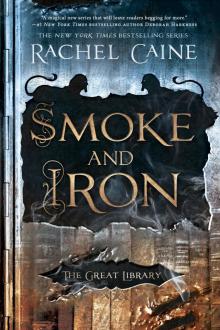 Smoke and Iron
Smoke and Iron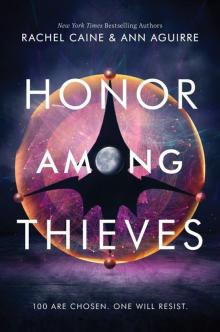 Honor Among Thieves
Honor Among Thieves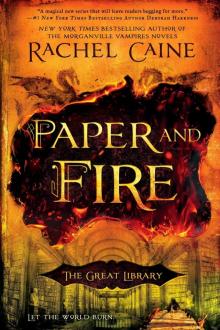 Paper and Fire
Paper and Fire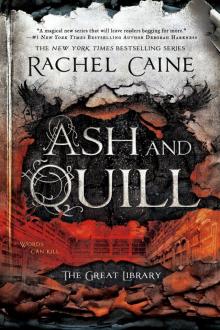 Ash and Quill
Ash and Quill Wolfhunter River (Stillhouse Lake Book 3)
Wolfhunter River (Stillhouse Lake Book 3) Undone
Undone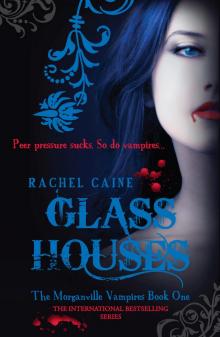 Glass Houses
Glass Houses Prince of Shadows
Prince of Shadows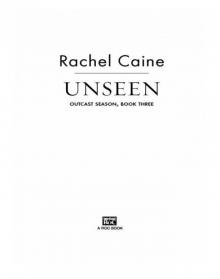 Unseen
Unseen Midnight at Mart's
Midnight at Mart's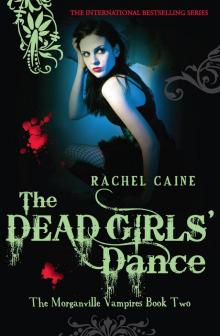 The Dead Girls Dance
The Dead Girls Dance Last Breath
Last Breath Stillhouse Lake
Stillhouse Lake Daylighters
Daylighters Midnight Alley
Midnight Alley Black Dawn
Black Dawn Fall of Night
Fall of Night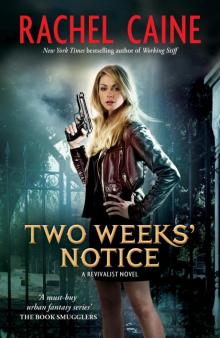 Two Weeks Notice
Two Weeks Notice Bitter Blood
Bitter Blood Carpe Corpus
Carpe Corpus Kiss of Death
Kiss of Death Ghost Town
Ghost Town Ill Wind
Ill Wind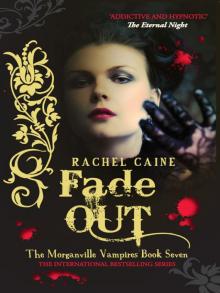 Fade Out
Fade Out Total Eclipse
Total Eclipse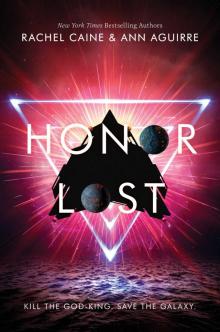 Honor Lost
Honor Lost Thin Air
Thin Air Black Corner
Black Corner Firestorm
Firestorm Bite Club
Bite Club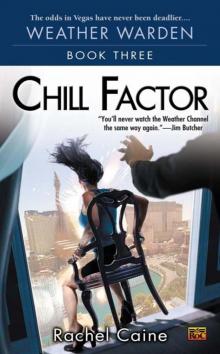 Chill Factor
Chill Factor Windfall
Windfall Oasis
Oasis Devils Bargain
Devils Bargain Terminated
Terminated Feast of Fools
Feast of Fools Lord of Misrule
Lord of Misrule Devils Due
Devils Due Ladies' Night
Ladies' Night Gale Force
Gale Force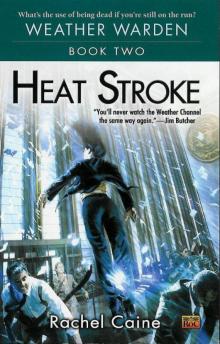 Heat Stroke
Heat Stroke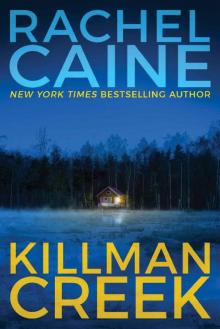 Killman Creek
Killman Creek Sword and Pen
Sword and Pen Cape Storm
Cape Storm Unbroken
Unbroken Windfall tww-4
Windfall tww-4 Heartbreak Bay (Stillhouse Lake)
Heartbreak Bay (Stillhouse Lake) Daylighters: The Morganville Vampires
Daylighters: The Morganville Vampires Duty
Duty Honor Bound
Honor Bound Unseen os-3
Unseen os-3 Firestorm tww-5
Firestorm tww-5 Blue Crush
Blue Crush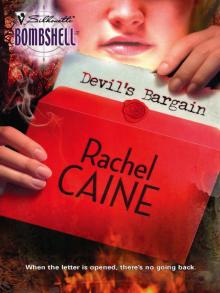 Devil s Bargain
Devil s Bargain Prince of Shadows: A Novel of Romeo and Juliet
Prince of Shadows: A Novel of Romeo and Juliet Bite Club mv-10
Bite Club mv-10 Terminated tr-3
Terminated tr-3 The Morganville Vampires 14 - Fall of Night
The Morganville Vampires 14 - Fall of Night Bitter Blood tmv-13
Bitter Blood tmv-13 Falling for Grace
Falling for Grace The True Blood of Martyrs
The True Blood of Martyrs Fall of Night (The Morganville Vampires)
Fall of Night (The Morganville Vampires) Devil's Bargain rld-1
Devil's Bargain rld-1 The Morganville Vampires (Books 1-8)
The Morganville Vampires (Books 1-8)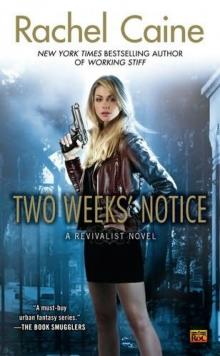 Two Weeks' Notice tr-2
Two Weeks' Notice tr-2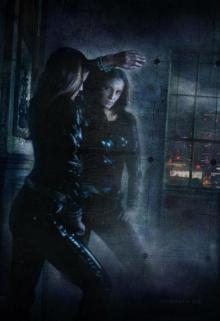 An Affinity for Blue
An Affinity for Blue Caine, Rachel-Short Stories
Caine, Rachel-Short Stories Kiss of Death tmv-8
Kiss of Death tmv-8 WITCHGRAVE
WITCHGRAVE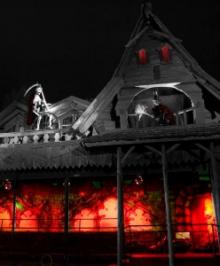 Dark Rides
Dark Rides The Morganville Vampires
The Morganville Vampires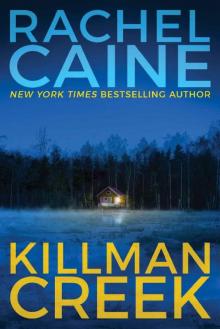 Killman Creek (Stillhouse Lake Series Book 2)
Killman Creek (Stillhouse Lake Series Book 2) Midnight Bites
Midnight Bites Line of Sight
Line of Sight![Morganville Vampires [01] Glass Houses Read online](http://i1.bookreadfree.com/i1/03/30/morganville_vampires_01_glass_houses_preview.jpg) Morganville Vampires [01] Glass Houses
Morganville Vampires [01] Glass Houses Black Dawn tmv-12
Black Dawn tmv-12 Midnight at Mart ww-103
Midnight at Mart ww-103 Feast of Fools tmv-4
Feast of Fools tmv-4 Ill Wind tww-1
Ill Wind tww-1 Devil's Due rld-2
Devil's Due rld-2 Black Dawn: The Morganville Vampires
Black Dawn: The Morganville Vampires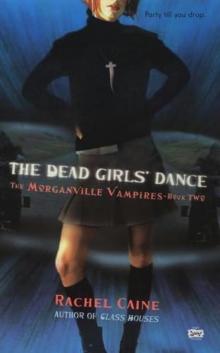 Dead Girls' Dance tmv-2
Dead Girls' Dance tmv-2 Minute Maids
Minute Maids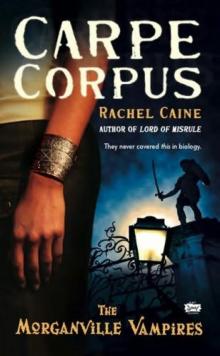 Carpe Corpus tmv-6
Carpe Corpus tmv-6 Total Eclipse tww-9
Total Eclipse tww-9 Ghost Town mv-9
Ghost Town mv-9 Lord of Misrule tmv-5
Lord of Misrule tmv-5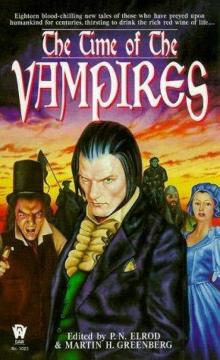 Faith Like Wine
Faith Like Wine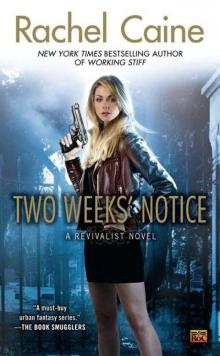 Two Weeks' Notice: A Revivalist Novel
Two Weeks' Notice: A Revivalist Novel Daylighters tmv-15
Daylighters tmv-15 Stamps, Vamps & Tramps (A Three Little Words Anthology)
Stamps, Vamps & Tramps (A Three Little Words Anthology) Unbroken os-4
Unbroken os-4 Unknown os-2
Unknown os-2 4 - Unbroken
4 - Unbroken Cape Storm tww-8
Cape Storm tww-8 Last Breath tmv-11
Last Breath tmv-11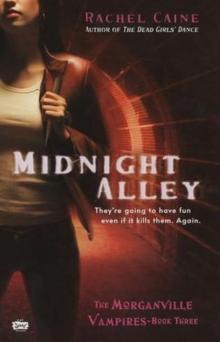 Midnight Alley tmv-3
Midnight Alley tmv-3 Glass Houses tmv-1
Glass Houses tmv-1 Fade Out tmv-7
Fade Out tmv-7 Fall of Night tmv-14
Fall of Night tmv-14 Godfellas
Godfellas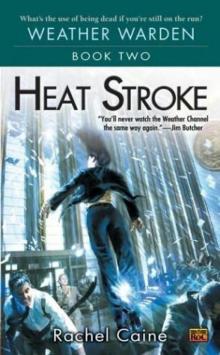 Heat Stroke ww-2
Heat Stroke ww-2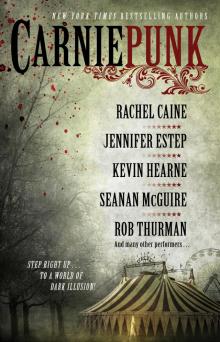 Carniepunk
Carniepunk Oasis ww-102
Oasis ww-102 Gale Force tww-7
Gale Force tww-7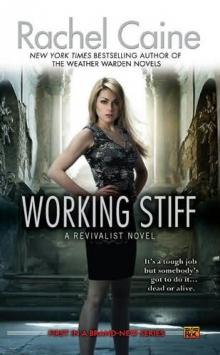 Working Stiff tr-1
Working Stiff tr-1